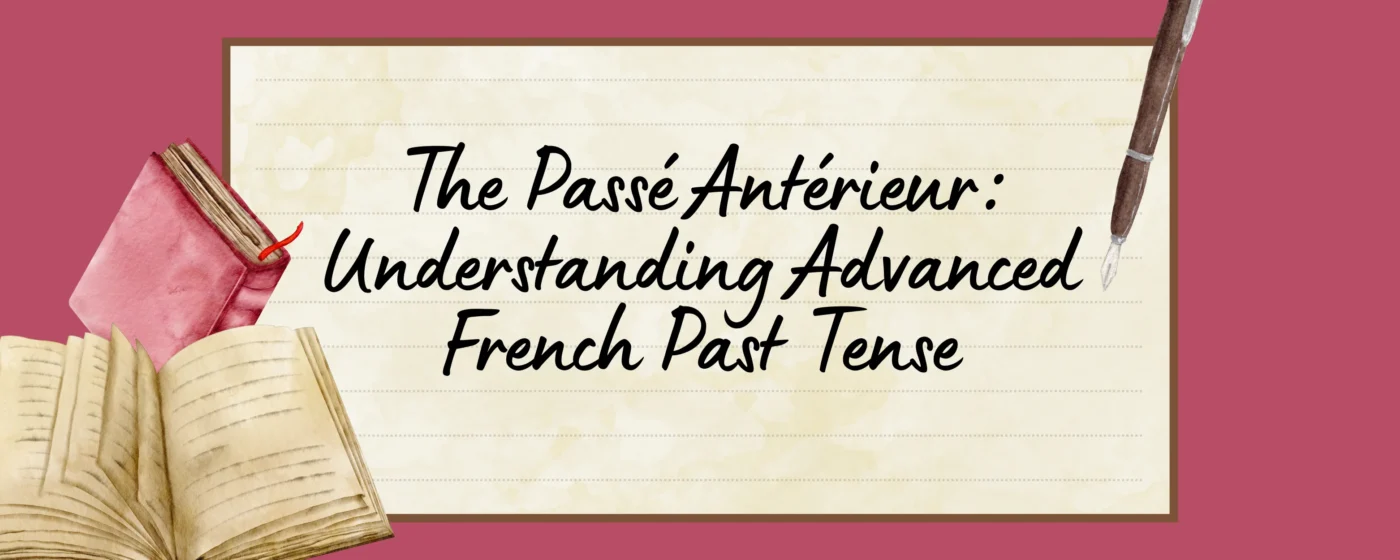The imparfait is a form of verbs used in the past tense in French. It is commonly confused with passé composé as both the forms are used for the past tense. It is important to note that passé composé denotes an action that is finished, while imparfait describes a continual activity and doesn’t depict an end to it. It is also used to describe situations in the past.
It is essential to practice using passé composé and imparfait to really understand the usage and the difference between the two.
What is Imperfect Tense (L’imparfait) in French?
As mentioned above, the imparfait is used to describe past events with no specific end to the said event. Let us understand this with an example:
Je jouais tennis quand j’etais petite.
Here, we can see the verbes “jouer” and “être” in the imparfait form. The sentence literally translates to “I used to play tennis when I was young.” In this sentence, we describe an activity (tennis), but there is no end point. We do not know when the doer stopped playing tennis. In the same sentence, “étais” is describing the time when the doer was young.
Following are a few more examples of the imparfait.
- Il aimait le théatre. He liked theatre.
- Vous faisiez des blagues chaque année. You did pranks every year.
- Ma mère preparait les riz tous les jours. My mother made rice every day.
- Elle portait une chemise blanc. She used to wear a white shirt.
In these sentences, we can see the use of imparfait. Further, we will look at all the situations where imparfait is used.
Situations Where Imparfait is Used
- Habits or things you did frequently
Imparfait is used to talk about actions done in the past habitually . These actions were repeated for extended periods of time.
Example: Je faisais yoga tous les matins. I used to do yoga every morning.
- Feelings, emotions, mental actions, or physical sensations
We use imparfait to talk about the age or describing physical, emotional, or mental states.
Example: Je me sentais triste après avoir vu le film. I felt sad after watching the film.
- Time and age
While describing the past event, we use imparfait to talk about the age
Example: J’avais 12 ans quand j’ai appris ce texte. I was 12 when i learnt this text.
- Two simultaneous events taking place at a non-specific point in the past
The imparfait is used when the beginning and end of an action are not specified, implying it was ongoing or without a specific duration.
Example: Je faisais mon travail quand les enfants jouaient. I worked when the kids played.
- Attributes or general descriptions of the past
When describing an event of the past, using imparfait helps in setting the scene and providing background details like weather and environment.
Example: Les nuages cachaient le soleil. The clouds hid the sun.
Il faisait chaud. It was hot.
- Ongoing actions interrupted by another action
The imparfait describes an ongoing action that is interrupted by another action, which is often expressed in the passé composé.
Example: Le train partait quand vous êtes arrivé. The train was leaving when you arrived.
- Politeness
The imparfait can be used to soften statements or questions, making them more polite or less direct.
Example: Je voulais demander quelques questions. I wanted to ask a few questions.
Grammar Made Easy as Bonjour!
Our
Rules of Conjugation
The conjugation for imparfait is very simple. The endings are -ais, -ais, -ait, -ions, -iez, -aient.
| Je | -ais |
| Tu | -ais |
| Il/Elle/On | -ait |
| Nous | -ions |
| Vous | -iez |
| Ils/Elles | -aient |
We can look at a few examples.
| Aimer (to like) | Finir (to finish) | Dormir (to sleep) |
| j’aimais | je finissais | je dormais |
| tu aimais | tu finissais | tu dormais |
| il/elle/on aimait | il/elle/on finissait | il/elle/on dormait |
| nous aimions | nous finissions | nous dormions |
| vous aimiez | vous finissiez | vous dormiez |
| ils/elles aimaient | ils/elles finissaient | ils/elles dormaient |
We can see that we take the roots of the verbs and add the above mentioned endings to make the imparfait.
Irregular Verbs in the Imperfect Tense
The irregular verbs seldom follow a rule. In this case, they do. The root might change, but the endings remain the same.
Lets have a look at a few examples.
| Avoir (to have) | Être (to be ) | Aller (to go) |
| j’avais | j’étais | J’allais |
| tu avais | tu étais | Tu allais |
| il/elle/on avait | il/elle/on était | Il/Elle/on allait |
| nous avions | nous étions | Nous allions |
| vous aviez | vous étiez | Vous alliez |
| ils/elles avaient | ils/elles étaient | ils/elles allaient |
Tips for Mastering the Imperfect Tense
To master anything in French, it is necessary to practice. Apart from that, following are a few things that might help to get better at using imparfait and using French in general
- Any exposure to content in French will help you understand and learn better. Even passive listening can prove to be effective. We recommend that you actively listen to podcasts, watch films and read books in French.
- Taking live classes from teachers will help understand the concepts better. We at La Forêt French Class, have experienced teachers who work with the students to make learning easy.
- Practice does make perfect. One must be really willing to learn and practice regularly to master the imparfait and French language in general.
Conclusion
The imparfait in French is very useful. In summary, the imparfait is a versatile tense that helps convey various aspects of past actions and states, providing a rich context and background to narratives and descriptions. It is not exchangeable with passé composé. Hence, one must know its usage too. It is important while giving description and talking about activities in the past without any end point. Repeating loudly and learning from mistakes prove effective while learning anything, especially languages.
Learn about other tenses like Passé Composé here or check our other articles on the blogs page to understand French grammar better.
Frequently Asked Questions
Q: What are the 6 endings of the imparfait?
Ans: The endings of imparfait are -ais, -ais, -ait, -ions, -iez, -aient.
Q: How is imparfait used?
Ans: The imparfait is used to describe past events with no specific end to the said event.
Q: What is an example of imparfait?
Ans: Je faisais yoga tous les matins.
Q: Why is “être” irregular in imparfait?
Ans: Être is an irregular verb. Hence, it is also irregular in the imparfait. Following is the conjugation of être in imparfait:
- j’étais
- tu étais
- il/elle/on était
- nous étions
- vous étiez
- ils/elles étaient





